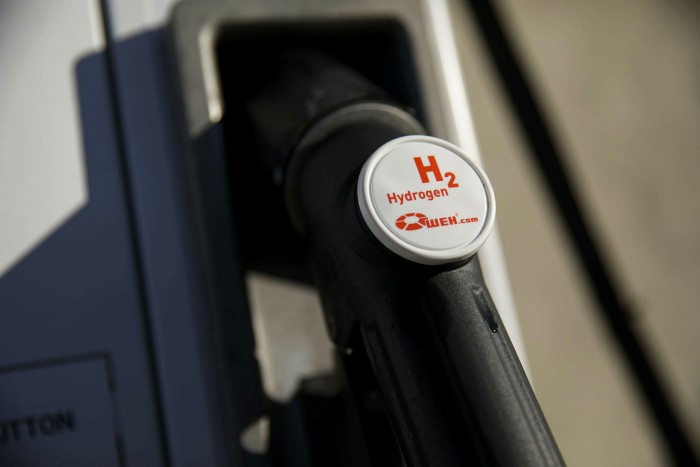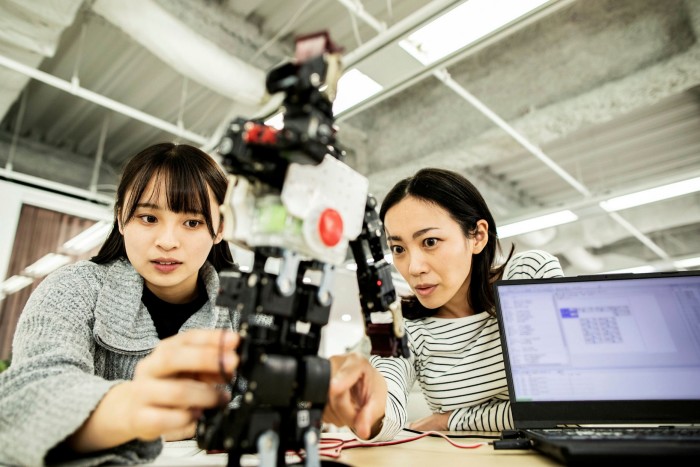Ukraine war puts Japan’s clean energy transition at risk

Simply sign up to the Energy sector myFT Digest -- delivered directly to your inbox.
Until one of the biggest earthquakes on record triggered a tsunami that destroyed the Fukushima Daiichi nuclear plant, just over 11 years ago, Japan’s energy supply rarely made front-page news.
The resource-poor country had 54 nuclear reactors providing about a third of its energy needs. And the nuclear power industry pumped enough money into the political system to ensure its place in the energy mix of the world’s third-largest economy was not questioned. It also provided a useful repository of cushy jobs for retired officials.
As a result, there was little demand for lawyers to support creative policymaking or become involved in innovative deals bringing sustainable energy to Japan.

But, as concerns mounted over other nuclear power plants following the Fukushima disaster, many reactors were closed or blocked from restarting. Japan shifted to liquefied natural gas (LNG) as a major source of energy, while the ministry of economy, trade and industry (Meti) ramped up investment in renewables.
Now, though, the war in Ukraine is throwing up further questions over the stability of Japan’s energy supply.
Rapid innovation and pro-bono legal work are needed to achieve this, says Mikiko Soga, a partner at Nishimura & Asahi with extensive experience in project finance.
Soga sits on a number of sustainable energy committees in the Japanese government and has founded a sustainability practice at the firm. For her, the Fukushima disaster had a personal dimension.
More from this report
Law firms face challenge of taking political stance on clients
Why foreign private equity is eyeing deals in Japan
US-China rift becomes a legal feud
Australia’s bank probe spurs digital mission
China’s homecomers bring flow of deals
Blockchain comes on board to smooth global supply chains
Legal ideas that boost business in the Asia-Pacific region
In March 2011, when the earthquake struck, Soga was in hospital, recovering from a traffic accident. As a result, she needed to use a wheelchair and underwent several months of treatment. “I was away from work for about a year. When I returned I asked myself: what should I focus my practice on?”
The outcome was a focus on sustainable energy solutions and innovative pro-bono work at government committees working on the deregulation of Japan’s electricity market — until then, controlled by an oligopoly of stodgy regional utilities, which stifled competition and innovation.
By increasing competition, the idea was that electricity would become cheaper and the service better for consumers. For the companies, pooling resources would make them less vulnerable and help them break into overseas markets with rising electricity demand, especially in Asia.
But the fledgling market is again under threat, with many players that joined when electricity was cheap now struggling because the war in Ukraine has sent oil and gas prices skyrocketing, says Soga. “Meti is working on how best to support the market so that the new electricity companies can continue to compete.”
While a shift towards renewables is enshrined in Meti’s plans, she says, policymakers are constantly worried about undermining the stability of Japan’s energy supply, given the country’s reliance on imported energy.
That concern was put into stark relief in March this year. Meti minister Koichi Hagiuda was forced to ask Tokyo residents to conserve electricity on an unseasonably cold day, shortly after a large earthquake caused several power plants to suspend operations, bringing the city to the brink of a blackout.
The conflict in Ukraine is complicating matters further due to Japan’s considerable imports of cheap Russian gas, produced jointly with Russian energy firms on the island of Sakhalin, north of Hokkaido.
About 10 per cent of Tokyo’s gas comes from Sakhalin, while Hiroshima relies on the source for half of its supply.
Japan has kept pace with western nations in imposing sanctions on Russia but its energy projects in the country are not included. “We are not pulling out,” says deputy chief cabinet secretary Seiji Kihara. “Unfortunately, our country’s energy self-sufficiency rate is in the single digits and we are the most vulnerable country in the G7. So, for us, energy is a matter of life and death.”
Still, in April, the Japanese government banned imports of Russian coal and, along with other G7 nations, has pledged to reduce its reliance on Russian energy overall.
To meet these goals, and hit its ambitious targets for renewables, the government will have to deploy huge amounts of solar and wind power. Renewables already account for more than a fifth of Japan’s electricity generation, but Tokyo aims to increase this to up to 38 per cent by 2030.
Companies are also looking to invest in solutions such as hydrogen as a means of storing and transporting power.

“I think renewables are going to step up very quickly,” says Matthias Voss, Allen & Overy’s Tokyo and Seoul managing partner. However, he adds: “There’s a limit to how much renewable energy you can digest without completely upgrading the grid, having battery back-up solutions, and still having something that addresses the intermittency of all the renewable sources.”
After Japan came up with its nationwide strategy prioritising hydrogen in 2017, Voss and other lawyers at the firm, such as senior associate Hitomi Komachi, started focusing on the hydrogen industry.
Voss founded the Hydrogen Interest Group, a firm-wide task force that Komachi says is designed to “bring all [their] expertise together and present it in a way that’s digestible and useful to clients”.
The firm is currently involved in projects in the production, storage and transport of hydrogen.
Japanese policymakers have long seen hydrogen as a potential alternative to fossil fuels in order to guarantee the country’s energy security. For decades, the gas — the lightest and most abundant element in the universe — has been hailed as a revolutionary, clean source of energy capable of fuelling cars, heating homes and storing electricity. But progress has been hampered by high costs of production compared with fossil fuels, transport challenges, and slow investment in infrastructure.
Still, technological advances are reducing these costs and, as solar and wind energy gets cheaper, the production of emissions-free “green hydrogen” — made by using renewable energy to split water into hydrogen and oxygen — could become commercially viable.
While Voss acknowledges various challenges with hydrogen — in smaller vehicles, for example, where “integration will remain challenging” — he remains optimistic.
“I like hydrogen because, unlike batteries, you don’t end up with a lot of very toxic waste that you ultimately don’t know what to do with. In some ways, batteries are like nuclear waste, but people gloss over that.”
Case studies:
People and skills
Social justice, inclusion and diversity
People and skills
Case studies in best practice. Researched and compiled by RSGI. “Winner” indicates the organisation won an FT Innovative Lawyers 2022 award; other organisations are listed alphabetically.
WINNER: MinterEllison
In order to prepare associates to make the leap to partner, the firm is running a training programme to develop lawyers’ strategic account management skills and broaden their internal and external networks. The programme gives associates the opportunity to develop client relationships by encouraging them to book meetings with clients unrelated to any particular legal matter, and to take on other practical work, such as account planning. This is supported by seminars and feedback.
Allen & Overy

In order to make its remote business development training as engaging as possible, the law firm collaborated with Australia-based sales consultancy Monte Rosa to transform the firm’s training content into a 90-minute virtual escape room — an immersive setting in which teams solve puzzles within a time limit.
The programme was developed for Allen & Overy free of charge, on condition that Monte Rosa could adapt the programme for other professional
services firms.
Ashurst

In July 2021, the firm implemented a globally consistent parental leave policy across all its offices, which offers 26 weeks of fully paid leave regardless of gender, along with generous leave provisions in the event of pregnancy loss. The policy covers employees at all levels of the firm, including those on probation. Legal staff have a three-month reduction in their billable targets when they return to work.
King & Wood Mallesons
The firm has continued to scale and improve its transformation programme — an initiative to train lawyers in legal technology — since launching it in 2020. The firm now offers externally validated “legal tech belts” inspired by the Lean Six Sigma management grading technique. The white belt is relatively easy to obtain, which helps encourage beginners, but each belt is progressively harder.
More than 75 per cent of the firm’s lawyers in Singapore and Australia have now achieved at least one belt.
Nishimura & Asahi
The law firm is the first in Japan to adopt financial and people management platform Workday.
Everyone in the firm’s Japan offices completes a record stored on the platform, which defines skills they have and those they wish to develop. This has made it easier for the firm to identify capabilities and facilitate career ambitions. The platform is being rolled out across the firm’s international offices.
Rajah & Tann

The law firm partnered with the National University of Singapore’s School of Computing to train lawyers in areas such as design thinking, financial technology, robotic process automation and blockchain.
Lawyers have used lessons from the programme to launch a number of digital initiatives. These include streamlining billing processes as well as developing a new client relationship management platform for the firm.
White & Case
The firm piloted a reverse-mentoring programme in Melbourne in 2021. The initiative, in which junior staff assist senior colleagues on the use of legal tech, gives partners the opportunity to develop their skills in specific technologies, including drafting tools or transaction management software.
In return, juniors receive face-time with more senior lawyers and develop soft skills such as persuasiveness. The initiative has also been rolled out to the firm’s German offices.
Social justice, inclusion and diversity
Case studies in best practice. Researched and compiled by RSGI. “Winner” indicates the organisation won an FT Innovative Lawyers 2022 award; other organisations are listed alphabetically.
WINNER: DLA Piper
In 2021, DLA Piper and Macquarie University, along with a number of partner organisations, launched Wallumatta Legal — a low-cost law firm that provides family law services to people in New South Wales, Australia, who would otherwise be unable to afford legal support. Law students from Macquarie volunteer at Wallumatta. By using technology to improve efficiency, the firm is able to offer low-fee services and aims to cover its costs in the near future.
Allen & Overy

The firm secured a settlement for an indigenous Australian man who had been assaulted by corrections officers while in custody. The legal system in Australia makes it difficult for prisoners to sue for assault while they are in custody, and there has been growing concern about the number of Aboriginal and Torres Strait Islander deaths in prison. The lawyers overcame numerous administrative hurdles that have made it hard for prisoners to bring this type of case in the past, as well as the challenge of gathering evidence while their client was incarcerated in remote locations.
Gilbert + Tobin

The firm developed a tool to identify potential gender bias in documents. This tool uses natural language processing software to flag extracts containing potential bias — such as assuming male or female, and excluding non-binary people. Lawyers can then review these extracts manually. In internal tests, the tool sped up the review process by 76 per cent and more than tripled accuracy. The tool has been used to review the firm’s documents for gender bias, and there are plans to expand its applications in the future.
Hogan Lovells
The firm’s Singapore team developed a low-bono fee structure so that it could take on Praesideo, a climate data platform, as a client. The fees that the team charged to Praesideo started low, and will increase as the start-up becomes more profitable. Such arrangements are unusual in Singapore, where pro-bono legal work is still relatively uncommon.
Pinsent Masons
Brook Graham, Pinsent Masons’ diversity and inclusion consultancy, launched a chatbot in Australia to assess an organisation’s diversity and inclusion progress and provide a road map for improvement. The chatbot offers businesses a 10-minute survey, which then creates a D&I benchmark to help measure future progress. It uses automation software from legal tech start-up Josef together with the consultancy’s model for measuring progress.
Since its launch around 125 businesses have used the chatbot.
RHT Law Asia

The Singaporean firm launched its environmental, social and governance practice and a governance-focused social enterprise, RHT Grace Institute, in 2020 to promote ethical leadership. The firm appointed a chief sustainability officer in 2021 and published voluntary sustainability reports, committing to reaching a target of net zero carbon emissions by 2030.
Yulchon
Since 2020, Yulchon and Onyul — Yulchon’s public interest arm, which focuses on pro-bono activities — have been supporting Daum Foundation’s incubation programme for non-profit start-ups in South Korea. It can be difficult to set up non-profit organisations in the country, partly because of the complex regulations and tax issues that surround fundraising. Yulchon and Onyul hired a lawyer to support the incubation programme and the non-profits directly. So far, 19 start-ups have been through the programme, with 50 per cent of them incorporating as companies.
Comments